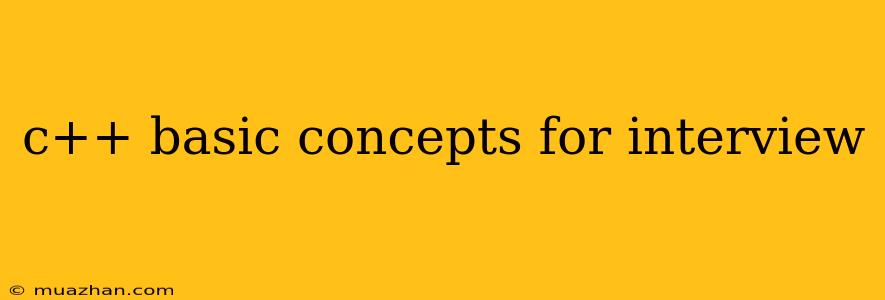C++ Basic Concepts for Interviews
Preparing for a C++ interview can be daunting, but understanding the fundamental concepts is crucial. This article will cover some key areas frequently explored during interviews.
1. Data Types and Variables
- Primitive Data Types: Know the difference between
int,float,double,char, andbool. Be prepared to discuss their sizes, ranges, and how they are stored in memory. - Variable Declaration and Initialization: Understand how to declare and initialize variables of different data types. Discuss scope and lifetime of variables.
- Type Conversions: Be familiar with implicit and explicit type conversions. Explain the difference between
static_cast,dynamic_cast,reinterpret_cast, andconst_cast.
2. Operators and Expressions
- Arithmetic Operators: Understand the precedence and associativity of operators like
+,-,*,/,%,++, and--. - Relational Operators: Know how
==,!=,<,>,<=, and>=work. - Logical Operators: Be familiar with
&&,||, and!for combining conditions. - Bitwise Operators: Discuss the purpose of
&,|,^,~,<<, and>>operators.
3. Control Flow
- Conditional Statements: Understand
if,else if, andelsestatements for decision-making. - Loops: Know how to use
for,while, anddo-whileloops for iterative tasks. - Switch Statements: Explain when to use switch statements and how they work.
- Jump Statements: Discuss the purpose of
break,continue, andgotostatements.
4. Functions
- Function Declaration and Definition: Understand how to define functions with return types and parameters.
- Call by Value and Call by Reference: Explain the difference between these two mechanisms for passing arguments.
- Function Overloading: Discuss how to create multiple functions with the same name but different parameter lists.
- Function Templates: Explain the concept of generic programming and how to create function templates.
5. Classes and Objects
- Object-Oriented Programming (OOP): Know the four pillars of OOP: Encapsulation, Abstraction, Inheritance, and Polymorphism.
- Class Definition: Understand how to define classes with data members and member functions.
- Constructors and Destructors: Explain the purpose and usage of constructors and destructors.
- Inheritance: Discuss different types of inheritance (public, protected, private) and their implications.
- Polymorphism: Explain how polymorphism is achieved through virtual functions and virtual tables.
6. Pointers and References
- Pointers: Understand how pointers store memory addresses and how to manipulate them.
- References: Explain how references are aliases for existing variables.
- Dynamic Memory Allocation: Discuss the use of
newanddeletefor allocating and deallocating memory dynamically. - Memory Leaks: Explain the concept of memory leaks and how to avoid them.
7. Standard Template Library (STL)
- Containers: Know the different container types (e.g.,
vector,list,set,map) and their characteristics. - Iterators: Understand how to use iterators to access and manipulate elements within containers.
- Algorithms: Be familiar with various algorithms provided by the STL, like sorting, searching, and transformation.
8. Exception Handling
- Exception Types: Understand the hierarchy of exception classes (
exception,runtime_error,logic_error). try,catch, andthrow: Explain how to handle exceptions using these keywords.- Custom Exceptions: Discuss how to define your own exception classes.
9. Input/Output (I/O)
- Standard Streams: Understand the use of
cin,cout, andcerrfor standard input, output, and error streams. - File Handling: Explain how to work with files using
ifstream,ofstream, andfstream.
10. Best Practices
- Code Style: Follow consistent coding conventions for readability and maintainability.
- Memory Management: Utilize dynamic memory allocation responsibly to avoid memory leaks.
- Error Handling: Implement robust error handling mechanisms to ensure program stability.
- Code Optimization: Learn techniques for improving code efficiency and performance.
By mastering these fundamental C++ concepts, you will be well-prepared for a variety of C++ interview questions. Remember to practice coding and solving problems to solidify your understanding. Good luck!
